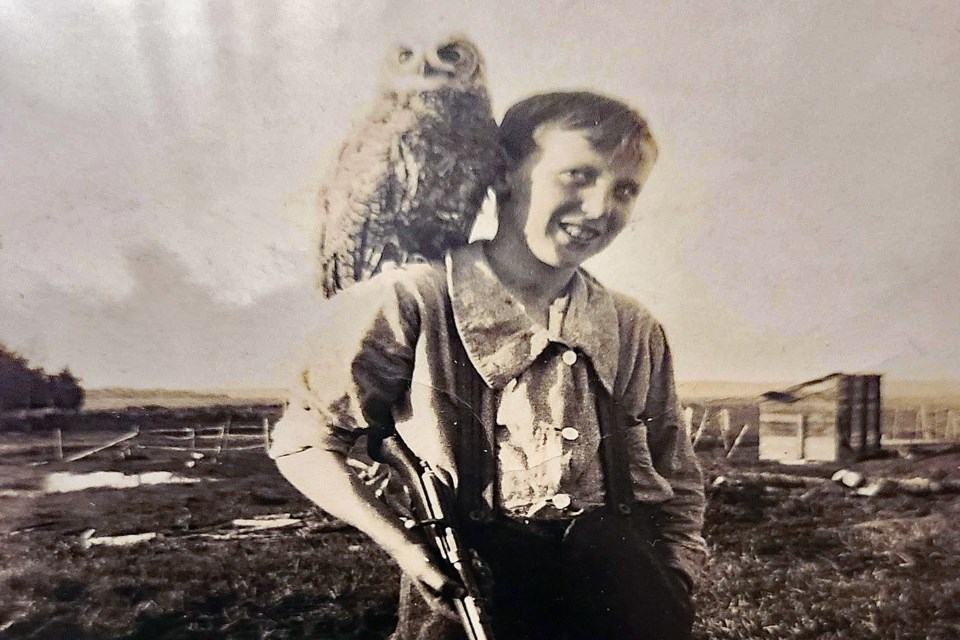INNISFAIL — John Carr Robinson was a man who embraced memories, particularly ones he knew he could never forget.
He was also a fellow who never forgot family roots, especially those for preserving wildlife habitat.
Robinson, who was known by all as Johnny, also never forgot what it meant to sacrifice one’s own life for others.
Shortly before the start of the Second World War, Johnny joined the 15th Alberta Light Horse Cavalry unit that trained west of Calgary at the Sarcee Camp. He rode his horse to Calgary and back to train.
“He was a man’s man. For him to ride a horse to Calgary and back was no big deal,” said Jason Peck, Johnny’s grand-nephew, who is head of the Wapoose Ranch, located about 15 kilometres southeast of Innisfail.
On one hot sultry day with the ominous threat of a storm bearing in, a bishop delivered a sermon on a hillside as troops of the cavalry unit stood by their horses.
“The scent of horse flesh and saddle leather perfumed the air,” wrote Johnny many years later. “The faint jingle of bits and bridle, the creak of saddle leather and horses occasionally snorting and pawing the ground as they become restless with the approaching storm.”
The bishop, wrote Johnny, told the troops the value of a human body could be measured in dollars and cents when one considered lime and calcium, which would be about $1.30.
“And his voice over the public address system sounded almost like the voice of God speaking to us from the clouds,” wrote Johnny. “As he closed his sermon, he described to us how although our bodies may only be worth $1.30, the value of the human soul is beyond all measure, for all eternity.”
Johnny recounted how the troops were, then marched off the field and over a hill to the west toward the on-coming storm.
“It looked as if they were marching straight into the rolling black clouds with jagged lightning flashing and straight into eternity,” he wrote. “Shortly thereafter, the Second World War broke out and many of those young men did, indeed, march into eternity to keep our country free.”
Johnny did not join his comrades in arms. His home was the Wapoose Ranch. Raising cattle was considered an essential service and he wasn’t posted oversees. He stayed home where his father William or “Bill”, a veteran of the First World War, ran the ranch he established in 1902 after leaving his native England in 1894.
“Bill was sort of a little unusual in that he was highly educated and an athlete. He went to Cambridge University, and you don’t see a lot of guys going to Cambridge and then farming in Alberta. But that was what he chose, the life of a cowboy,” said Peck of his great-grandfather.
Bill enlisted in the 187th Central Alberta CEF Battalion in 1918. He sailed from Halifax to England on the re-fit troop carrier RMS Olympic, which was Titanic's sister ship. He served as a veterinary sergeant due to his experience with horses. Bill, whose wife Maud and children joined him in England, was also in charge of captured German prisoners at the Aldershot Military camp in England. He was well liked by the prisoners, with one even making Maud a little wooden trinket box.
The family returned to their beloved Wapoose Ranch after four years of war. Bill died in 1943 and Johnny, who never married, would run the ranch with his sister Dianna for the rest of their lives. But there was also an even higher calling — a profound love for nature.
“We are responsible to see that all God's creatures have a place to live,” wrote Johnny in a story called Going to School with the Meadowlarks. “Surely, it isn't necessary to drain all the sloughs and bulldoze every tree to get another dollar. Once anything in nature is destroyed, it is gone forever and all the dollars we can print, can never buy it back again.
“I have 640 acres of farmland and about 100 acres of that is as natural as the day it was created,” he added. “As long as I own it, that is the way it will stay.”
Johnny died in 1997 at the age of 81. The following year, Peck took over the Wapoose Ranch, which now is just a quarter-section in size. Along with wife Trudy and son Spencer, they are proud carriers of the family’s proud military legacy and love of the land.
“I take it as a responsibility to take up what they believed in, especially when it comes to the land,” said Peck. “When I first moved in, there had been a lot of clear-cutting of bush. I feel like I am holding on to this last bastion of wildlife.
“Number one is protecting the land.”



